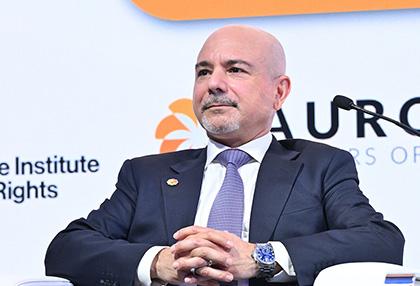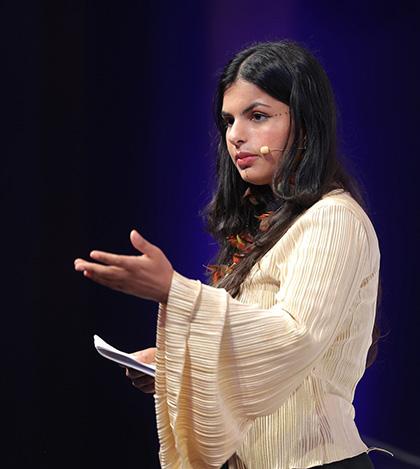Human rights advocates from around the world gather at UCLA to chart the future
The 2025 Human Rights and Humanitarian Forum featured activists, scholars and policymakers from 30 countries

Rapid changes in the global order, finding optimism under great duress, rebuilding the international rule of law, and blazing a positive path forward were the issues at hand as thought leaders gathered at UCLA’s Luskin Conference Center earlier this month for the 2025 Human Rights and Humanitarian Forum.
The daylong event, presented by The Promise Institute for Human Rights at UCLA School of Law and the Aurora Humanitarian Initiative, brought together activists, policymakers, legal advocates, academics, and journalists from around the world — including recipients of the Nobel Peace Prize and Pulitzer Prize and UCLA faculty members — for a series of conversations around the theme “At the Crossroads: Driving Integrated Action for a Resilient Future.”
As interrelated global challenges continue to intensify — from violent conflicts and refugee crises to economic slowdowns, rising inflation, and climate change — the forum aimed to seed lasting partnerships and spark new approaches to tackling these issues and advancing peace, justice and human dignity, said Dr. Eric Esrailian, founding donor of The Promise Institute, a board member of the Aurora Initiative, and chief of the UCLA Vatche and Tamar Manoukian Division of Digestive Diseases.
“Today’s intersecting crises demand new approaches to creating lasting change,” Esrailian said. “I think that there are circumstances where we get discouraged … . But even then, I feel that there are opportunities for people to not just fight back but to create alliances that can be sustainable for the long term.”
The forum’s keynote conversation, “Local Power, Global Change,” featured Chelsea Clinton, vice chair of the Clinton Foundation and a leader in global public health initiatives; Peter Laugharn, president and CEO of the Conrad N. Hilton Foundation and an advocate for vulnerable children around the world; and Leymah Gbowee, a women’s rights activist and winner of the 2011 Nobel Peace Prize. Their conversation focused on the transformative power of local leadership and inclusive action. The panelists were introduced by UCLA Chancellor Julio Frenk.
“In this room, we have people approaching humanitarian crises from every angle, passionate advocates who risk their lives for strangers and give voice to the voiceless,” Frenk said. “We have scholars and leaders who are unafraid to ask the toughest questions and seek evidence-based, systemic change. You are breaking down silos. You are bringing your global perspectives to local problems, reminding us all: Everything local is global, and everything global is local.”

Earlier in the day, Michael Waterstone, dean of UCLA Law, welcomed participants and emphasized the valuable role that each person played in carrying the cause of human rights.
“It is so fitting that this event is happening at UCLA,” he said. “As the dean of UCLA Law, I experience time and again just how important it is that we are situated here, in this global city of Los Angeles, where we have the opportunity to make a meaningful impact in so many ways, from the local to the international.”
“Our mission is to empower the next generation of human rights lawyers and leaders, and to engage research and scholarship to drive real-world impact,” said Catherine Sweetser, interim executive director of The Promise Institute. “It was inspiring to hear from young people like Ana Giménez Pozzoli, founder of Ducha de Sol, and Ayisha Siddiqa ’27, founder of the Future Generations Tribunal (and a UCLA Law student), about the environmental issues that are crucial to their generation.”
The forum included the probing discussions “Global Pulse Check,” “The Future of Human Rights,” “Modern-Day Heroes: Lessons in Resilience from Aurora Humanitarians,” “Rising Generation: Young Activists Redefining Justice and Humanitarian Action,” and “Health and Human Rights: Grassroots Approaches for Lasting Impact.”
Noubar Afeyan, cofounder and chair of the Aurora Humanitarian Initiative and founder and CEO of Flagship Pioneering, emphasized the importance of resilient action in the face of growing inhumanity around the world.
“Today, the inhumanitarians are winning,” he said. “We will all be facing choices as to when to speak up because it’s happening on our watch … . It puts even more pressure on the individuals to act both on the philanthropy side but also in the field actually saving the lives of others.”
While discussing the challenges and uncertainties facing the field, panelist Comfort Ero, president and CEO of the International Crisis Group, recounted the example of a group of Sudanese resistance fighters who decided to convert their resources into an emergency room in the midst of cruelty and humanitarian blockages.
“That in the onslaught of the violence and the horror and pain — that you would be able to transform yourself and work across sectors — that gives me hope: the ability of humanity to be innovative in a moment where we’re up against the wall,” Ero said.
“Throughout the day, we heard repeatedly from our speakers the value of empowering local actors around the world, looking for decentralized and community-led solutions,” Sweetser said. “Understanding that local shifts can have resonant impact worldwide is part of the promise of human rights and humanitarian work which makes it so worth pursuing.”
Media Contact
- Natalie Monsanto, Communications Director, The Promise Institute for Human Rights
- monsanto@law.ucla.edu